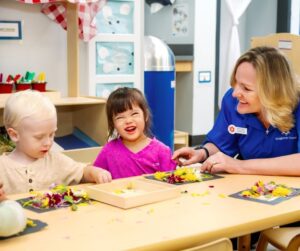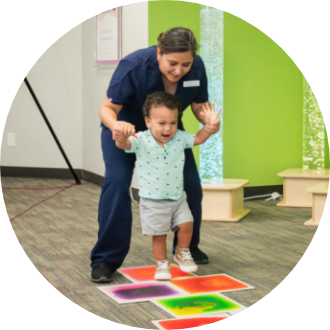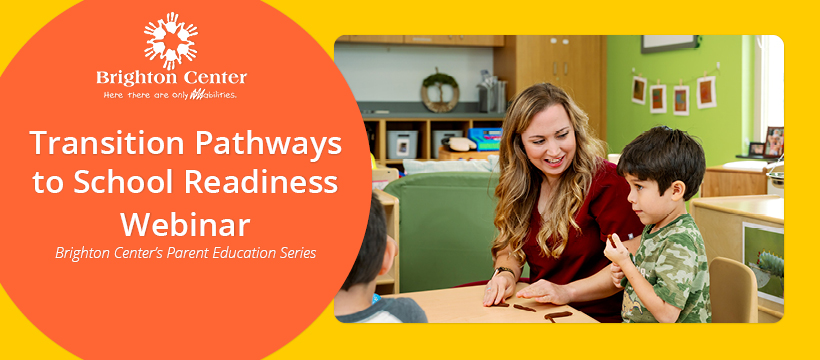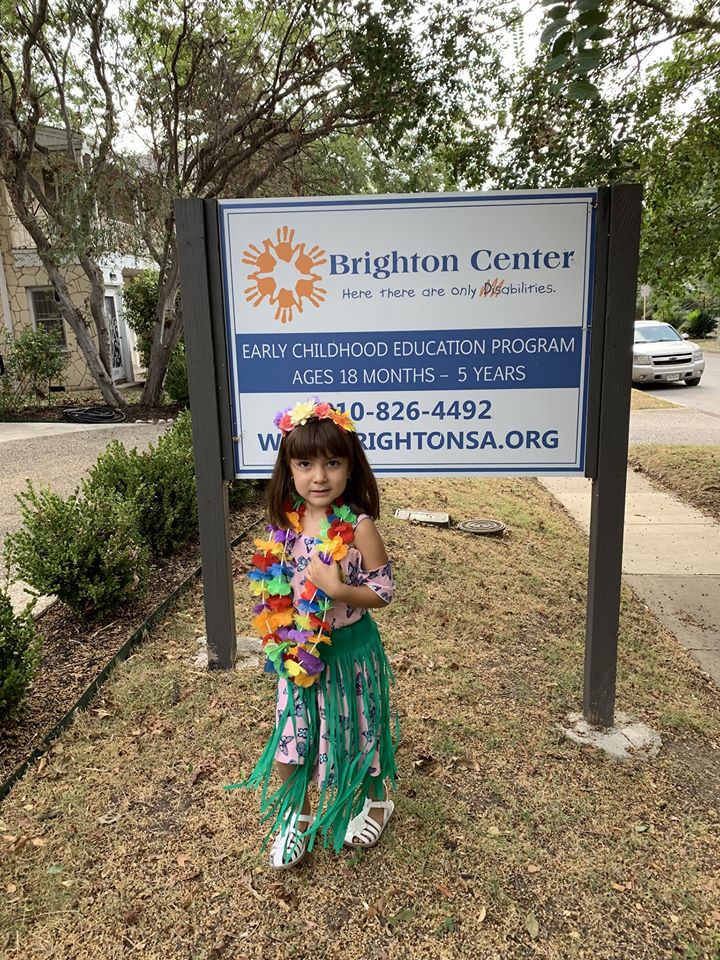Texas Early Childhood Intervention (ECI) provides services and support to infants and toddlers (0-36 months) who have developmental delays or a disability and their families. When we intervene early, we can have a significant impact on a child’s development and interventions are more likely to be more effective provided earlier than later. In the first 3 years of a child’s life, the connections in a baby’s brain are most adaptable. These connections are important as they are the foundation for learning and behavior. As children get older, these connections are harder to change. After a child reaches age 3, they can transition from Early Childhood Intervention Services to Texas Public School Services.
With Early Childhood Intervention services, a child’s developmental trajectory can change, improving not only outcomes for the child, but the family as well. Brighton Center is an ECI provider through the State of Texas. We’ll explore the challenges families can face in making this transition, and strategies that can help ease the transition.
An Introduction to Early Intervention Services

Early Intervention Services began in 1975 when Congress enacted the Education for All Handicapped Children Act, Public Law-94-142, to support and protect the rights of infants, toddlers, children, and youth with disabilities and their families. In 1990, this law’s name changed to the Individuals with Disabilities Education Act (IDEA). Early Intervention today is provided through Part C of IDEA. These laws were established to enhance the development of babies and toddlers with disabilities to minimize the potential for developmental delay, reduce educational costs by minimizing the need for special education, increase the potential for these children to live an independent life, and overall enhance the family’s abilities to meet the needs of their baby.
Texas Early Intervention Services are only for children 0-36 months. Therefore, many parents wonder what is next to help their child. For a majority of children enrolled in Texas Early Childhood Intervention (ECI) services, the next step would be Part B of IDEA (services from their local school district). Many parents are unaware that their child who has a developmental delay or disability can receive services in the Texas public school system beginning at age 3. If a child qualifies for educational services in their local school district, this will look very different from ECI services. Nevertheless, they are still beneficial.
Moving from the Early Childhood Intervention Service’s family, developmental focus to the Texas public school service’s child, educational focus can be difficult for parents. Transitioning from ECI Services to Texas Public School Services begins well before your child’s 3rd birthday. In fact, you should look for information during your child’s 2nd year. Nevertheless, when the big day comes, there are some strategies you can use to ease the transition.
Tips for Transitioning to Texas Public School Services
 School Familiarization
School Familiarization
Although your school might offer an orientation day also known as “meet the teacher” it may help to continue discussing with your child the layout of the school. As a parent, you can ease this process by asking the teacher or administrative staff to see if there is an option to walk around the school grounds to help your child feel comfortable. This may need to take place a couple of times. Repetition will help your child feel at ease and confident when they are entering the school.
While walking the school grounds, take pictures of the classroom, playground, etc. This will help your child to understand what the first day may look like and make the transition to Texas Public School Services easier. Informing your child’s teacher and briefly explaining their feelings can be beneficial and they can help provide extra support. Teachers are very resourceful; they may also have some helpful tips that you have yet to think of.
 Bedtime
Bedtime
Depending on their age, children will typically need 9.5 to 11 hours of sleep a night. It is in the best interest of your child to prepare them a couple of weeks ahead. Take this chance to continue and/or begin a bedtime story routine. Moreover, allow your child to select the book. This will give them something to look forward to when bedtime approaches. Bedtime is also a perfect time to bond with your child and end the day on a good note. Reading books about going to school like, “Pete the Kitty’s First Day of Preschool”, “Preschool Here I Come”, “Biscuit Goes to School” or “My First Day of Preschool”.
 First Day
First Day
It is important to establish a routine for school days. The morning routine will set the vibe for the rest of the day. The first day of anything new can be hard, let alone transitioning to Texas Public School Services from ECI Services.
Prior to the first day, go over what the mornings will look like. You can even practice. Think about what time is wake-up time? What time do we need to leave the house? This is a great time to use those pictures you took of the school to discuss what their school day might look like. Keep the mornings positive by talking about how exciting school is, making new friends, etc. It could also be beneficial to create a goodbye ritual. Whether you are taking your child to school or putting your child on the bus, a goodbye ritual can help provide comfort and familiarity for your child to know what is coming next in the schedule.
Pulse Check
Once school starts and you’ve established the routine, it is important that you check in with the teacher. Figure out how you and the teacher will check in with each other. This includes finding out what is the best way to communicate with the teacher. You should receive progress reports of how your child is doing. These progress reports should include the goals you and your child’s educational team agreed on. You can inquire about any strategies they may be using in school that you could try at home to reinforce the work they are doing.
As a parent, you may need some strategies to ease your transition to Texas Public School Services as well. Give yourself a pep talk. Tell yourself that you are doing what is best for your child and that it’s the right decision. Remind yourself that a child’s transition to something new may take longer than you expect, and you must have patience. Make new friends with other parents in the classroom. They’re in the same boat as you and this can give you a support system that you need, and a bonus is future playdates for your child!





















